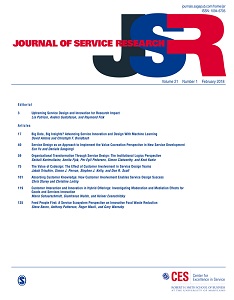Academic articles
Practitioner articles
Working papers
Books
Book chapters
Case studies
Other publications
Subject(s)
Marketing
Keyword(s)
Service expectations, customer satisfaction, information processing, ability to evaluate, motivation to evaluate
JEL Code(s)
M310
Extant research established that customers’ expectations play an ambivalent role in the satisfaction formation process: while higher expectations are more difficult to meet and thus cause dissatisfaction, they simultaneously increase satisfaction via customers’ perceived performance owing to a placebo effect. However, to date, knowledge is scarce on the question under which conditions either the positive or negative effect of expectations on satisfaction prevails. Building on information processing theory, the authors hypothesize that an essential contingency of the indirect, placebo-based effect is the degree to which customers are able and motivated to process a service experience. Three studies with a total of over 4,000 customers in different service contexts provide strong evidence for this hypothesis. Thus, managers are well advised to provide a realistic or even understated prospect if the service context favors customers’ ability or motivation to evaluate. Conversely, if customers are neither able nor motivated to evaluate the service, increasing customer expectations represents a viable strategy to enhance satisfaction. Relatedly, if customers hold low service expectations, managers should foster customers’ ability and motivation to evaluate the service. In contrast, if service expectations are high, managers may benefit from reducing the likelihood that customers overly focus on the service performance.
With permission of SAGE Publishing
Volume
19
Journal Pages
361–379
Subject(s)
Economics, politics and business environment
Keyword(s)
Multimarket firms, entry, predation, reputation
Volume
81
Journal Pages
571–579
Subject(s)
Finance, accounting and corporate governance
Keyword(s)
Consumer loans, loan officer incentives, hard information, information manipulation
JEL Code(s)
G21
Banks have been subject to a wave of investigations regarding fraudulent behavior. Much of the discussion centers on manipulation of hard information by employees down the line, who missell mortgages due to flawed debt-to-income ratios or manipulate LIBOR and FX rates. Despite these prominent cases, little is known in the academic literature as to whether and how manipulation of hard information is affected by incentives of these employees, and if anything there is increasing reliance on quantitative, hard information based models for regulating banks. In this paper, we fill this gap by analyzing almost a quarter million of retail loan applications. We show that loan officer incentives significantly skew ratings even in settings where ratings are computed using hard information only. These incentives have a first-order effect on bank profitability. Our results suggest that ratings are subject to the Lucas critique: Incentives influence the hard information reported by loan officers and thus change the link between hard information and default probabilities.
Pages
53
Subject(s)
Human resources management/organizational behavior
Keyword(s)
Biography, psychodynamic approach, management science, clinical paradigm, universal motivational drivers, leadership development, group coaching, legacy
The full text of the working paper is available at SSRN.
Pages
35
Subject(s)
Information technology and systems; Technology, R&D management
Keyword(s)
Key operational investments
JEL Code(s)
D80
How does your organization manage the money it spends on digital? One surprising finding of my research is that most do not distinguish between different types of digital investments, treating all in a similar way. This situation exists because, believe it or not, a lot of organizations lack any mechanisms to help them actively manage the evaluation, selection, monitoring, and adjustment of digital investments to achieve clearly defined business results while meeting clear risk and return expectations.
ISSN (Print)
0017-8012
Subject(s)
Human resources management/organizational behavior
Keyword(s)
Decision making, ethics, psychology, research management
We present the data from a crowdsourced project seeking to replicate findings in independent laboratories before (rather than after) they are published. In this Pre-Publication Independent Replication (PPIR) initiative, 25 research groups attempted to replicate 10 moral judgment effects from a single laboratory’s research pipeline of unpublished findings. The 10 effects were investigated using online/lab surveys containing psychological manipulations (vignettes) followed by questionnaires. Results revealed a mix of reliable, unreliable, and culturally moderated findings. Unlike any previous replication project, this dataset includes the data from not only the replications but also from the original studies, creating a unique corpus that researchers can use to better understand reproducibility and irreproducibility in science.
Volume
3
ISSN (Online)
2052-4463
Subject(s)
Product and operations management; Strategy and general management; Technology, R&D management
Keyword(s)
decentralized energy, RWE, E.ON, Germany, power generators
JEL Code(s)
Q40, Q48
Volume
26
Journal Pages
10–12
Subject(s)
Technology, R&D management
Volume
2016
Journal Pages
663–670
ISSN (Online)
2194-4172
Subject(s)
Strategy and general management
Keyword(s)
Case Study Writing; Case Study Teaching; Case Study Method
Secondary Title
Case studies as a teaching tool in management education
Pages
121–140
ISBN
9781522507703
Subject(s)
Management sciences, decision sciences and quantitative methods
Keyword(s)
Shapley value, potential, random partition, concentration of power, communication graph, fairness, efficiency, efficient extension, fair extension, Myerson value
JEL Code(s)
C71, D60
We study values for TU games with a communication graph (CO-values). In particular, we show that CO-values for connected graphs that are fair and efficient allow for a unique efficient and fair extension to the full domain.
With permission of Elsevier
Volume
146
Journal Pages
103–106

